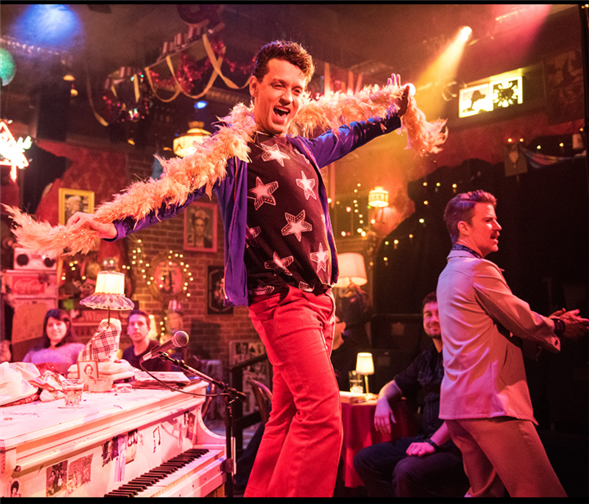Translate Page

A new show remembers the fire at the UpStairs Lounge
---
Stepping across the threshold of the Lynn Redgrave Theater, audience members attending The View UpStairs find themselves in an immersive set recreating the The UpStairs Lounge circa 1973, an under-the-radar gay bar in New Orleans' French Quarter. With a white grand piano standing center, the room is a cluttered and campy explosion of strung colored lights, portraits of musical icons, kitschy knickknacks, and a life-size cutout of the infamous Burt Reynolds nude centerfold.
Although immersive sets are increasingly in vogue, the choice here is meaningful and effective, as the characters that inhabit this eccentric dive cherish the solidarity and solace it offers them from the disapproving world outside. Because they are so completely in this space, audiences can share its cloistered sense of community.
And of course if we know what the bar represents to its patrons, it makes what happens there even more harrowing. Though it is thought-provoking and frequently funny, this musical, which is written and composed by Max Vernon and directed by Scott Ebersold, is inspired by a dark event in LGBT history. On June 24, 1973, an arsonist torched the UpStairs Lounge, killing 32 people inside.
The show opens as Wes (Jeremy Pope), an aspiring fashion designer, examines a dark, dilapidated space, intending to purchase the building and launch a boutique. Suddenly, he is transported to The UpStairs Lounge—the space's previous tenant—and surrounded by its patrons in 70s garb. As he interacts with the regulars, he learns how the past both diverges from and connects to his own era.
{Image1}
Vernon's score also bridges gaps. Performed by ten strong vocalists and an ace five-piece band, the numbers filter 60s and 70s rock, pop, and disco through a modern lens. "It was fun to take those influences and write a score that sounded like my music," says Vernon. "I worked with [orchestrator and musical director] James Dobinson to make sure that we were creating something that wasn't pastiche. It sounded original but tipped a hat to that time."
Although Vernon is 28 years young, his musical roots reach further back. "Growing up, all the kids were listening to the Spice Girls," he says. "But my dad had me listening to David Bowie, Lou Reed, The Mamas And The Papas, Queen, and Fleetwood Mac. It just so happens that the year the show is set in was one of my favorite years for music. There was Joni Mitchell, Earth Wind & Fire, Bette Midler, and one of my favorite records of all time, Stevie Wonder's Talking Book. That's the era my mind goes to, compositionally."
While circulating New York clubs, performing his compositions as a solo act, Vernon became disenchanted with the state of lyrics in current pop. "In the music I grew up with, I loved the stories; I loved the exploration of character," he explains. "That's now been thrown out."
Vernon's colleagues suggested that his lyrical storytelling style could be an asset in musical theatre. "It really clicked," he says, "I've carved out a space for myself as that 'statement brooch'-wearing weirdo who writes musicals about Korean pop stars, gay '70s, bars and the apocalypse."
While Vernon admires the classic musical theatre canon, his inner downtown iconoclast burns bright. "We need theatre that's political and speaks to the world we live in now and the music being created right now," he says. "I didn't write this show for everyone. I wrote it for myself and for a very specific audience. Musically, I'm trying to speak to what a hipster in Brooklyn might go to see on a Saturday night. And great musicals can find an intersection between worlds, like The Rocky Horror Show and Hair. Those two are the golden standard of what a weird, quirky, imperfect, flawed-but-vibrant downtown rock musical should be."
He adds, "It's weird: Sometimes you start writing a piece and don't totally know why you're writing it. And then the universe reveals it. When I started writing the show, gay marriage wasn't legal and Pulse hadn't happened. Now Trump has been elected, and all of a sudden it feels like it's not just my character going back to 1973; it's our entire country. The reason why I was writing the show revealed itself over the four years it took to write it. The show is now sandwiched between two tragedies: the UpStairs Lounge fire and Orlando. It's about how we can now look at the past to figure out how to survive the next four years—to make the world better, fight for equality, take up the torch and keep marching."
---
TDF Members: At press time, discount tickets were available for 'The View UpStairs.' Go here to browse our current offers.
Jeff Potter is an arts journalist and musician living in Washington Heights.
Photos by Kurt Sneddon. Top photo: Michael Longoria and Randy Redd.